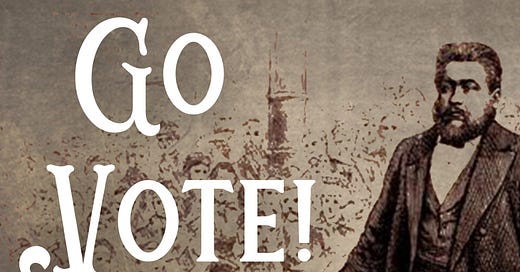A meme with a bust of Spurgeon appears like clockwork around election time. "Of two evils, choose neither!" I heard this when Hillary Clinton was running against Donald Trump in 2016, and then before the last two elections against Biden and Harris. I even saw it on a t-shirt this year. The logic typically goes like this: If Candidate "A" is overtly evil, I shouldn't choose them. If Candidate "B" is less evil, they are still evil and I shouldn’t choose them. I should choose neither, or else I play a part in evil. Whenever Spurgeon's name is invoked with this logic during our political elections, I'm almost sure there's a sound of shuffling in his grave at West Norwood Cemetery in London, and I can picture a small, slow-rolling tear crawling down the Spurgeon bobblehead in my office. Why? Because Spurgeon never said that phrase in this way.
I contacted the Spurgeon Center at Midwestern Seminary, home to the world's largest library of Spurgeon materials. The research assistant, Isaac Pang, directed me to the actual quote in context, confirming my suspicion that Spurgeon was not speaking of something as petty as politics. Instead, in his sermon on June 28, 1906, Spurgeon said, "And, dear friends, we need keeping from an evil spirit. I do not know whom I should prefer, — to see one of my dear Christian brethren fall into doctrinal error, or into an un-Christian spirit. I would prefer neither, for I think this is a safe rule, — of two evils, choose neither."1 This is not a general rule for all occasions and certainly did not reflect Spurgeon’s actual involvement in politics.
According to the Spurgeon Center, Spurgeon was not a political abstainer. “He was pro-life at every stage of human development, spoke harshly against the evils of abortion (which he called "infanticide"), believed that God blesses a nation committed to Christian principles, supported Bible reading in public schools, and upheld the separation, not of church and state, but of the Anglican Church and state. Spurgeon was also pro-gun, enjoying fox and pheasant hunting with his friend James Toller in Waterbeach.”2 He actually charged his people to vote, saying, "We are now called upon to exercise one of the privileges and duties which go with liberty, let no man be neglectful in it. Every God-fearing man should give his vote with as much devotion as he prays."3 He certainly wanted his people focused on the Gospel and not entrenched in politics, but the misrepresentation of Spurgeon's words to suppose some moral superiority in inaction is misguided.
Besides this, the logic presented in the misapplied meme presents a false dilemma. We are not faced with two equally evil choices; we face choices of degrees, and “not voting” is also a choice. To “not vote” implies voting is inherently bad, and abstaining is a moral high ground. But what if my “not voting” contributes to greater evil? Can't I ask which of the three options will do the most good? In our case, it's not Trump vs. Hillary or Trump vs. Harris; it's "certain death for the unborn" vs. “life for some unborn”; It is this up against me hiding my talent instead of investing it for fear of the harshness of my master (Matthew 25:14-30). It's Marxism vs. constitutional freedoms (speech, religion, bearing arms); and this becomes the dilemma between that and me allowing pagans to decide what is ethically and morally good. Our goal is not to stand for the truth of Trump, but for the Truth of Scripture which is good for all people. In the end, I have to conclude voting for Trump is the least evil and the most potential good of the options I have. Doing nothing does no good.
The argument of choosing “neither evil” breaks down when faced with real-world consequences. We are often cornered into making the best choice among imperfect options. Some refuse to acknowledge our Western calendar because of its pagan origins (Thursday honors Thor, Sunday is the sun god.) Should I use this calendar or confuse the daylights out of people when I speak? Others boycott companies like Apple for their stance on social issues, only to realize later that when alternatives disappear, one must choose the lesser of evils or revert to more primitive solutions like paper and pen. Which of these will allow for the greater good when my options are removed? I might end up with the Amish in the end—but then again, they would see me as evil and I’m certain to be shunned. Our principles hold until they are challenged by the limitations. Then, you must do the best you can until better choices emerge.
In our current political climate, I find myself defending Trump, not for his character or demeanor, but for the potential outcomes of his policies. Which seems to be more good than doing nothing, and certainly more good than Marxism. Over Trump’s term, his administration supported constitutional values, promoted ethical legislation, and implemented financial policies that protected the earnings of the working class. All of this aligns with my Christian values even if imperfectly. No, this election, I will vote, and I will vote for Trump, not with enthusiasm for his character, but with the hope that God will bring about more good than evil. These are the choices. So, my encouragement: be like Spurgeon—pray, and go vote!
Metropolitan Tabernacle Pulpit Vol. 52 in Sermon No. 2994. Pang also provided a link for reading the full sermon. (https://www.spurgeon.org/resource-library/sermons/judes-doxology/#flipbook/)
Metropolitan Tabernacle Pulpit Vol. 52:315.
https://www.spurgeon.org/resource-library/blog-entries/how-would-spurgeon-vote/





